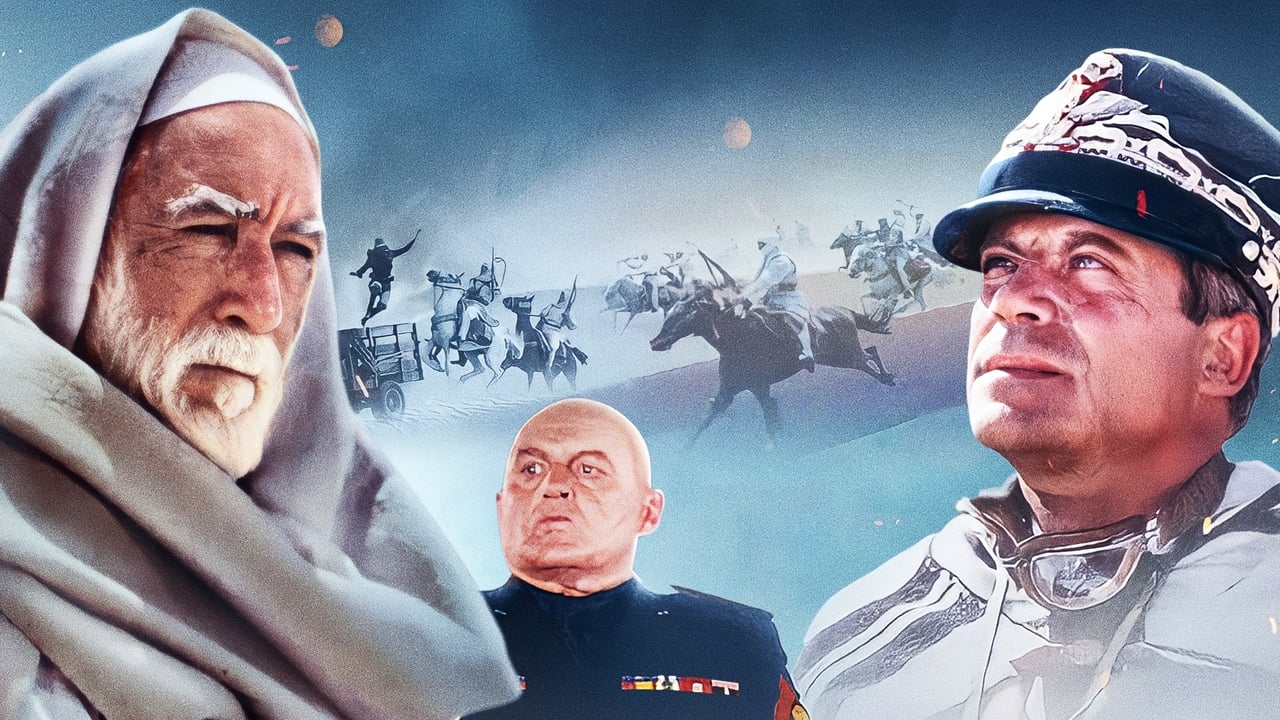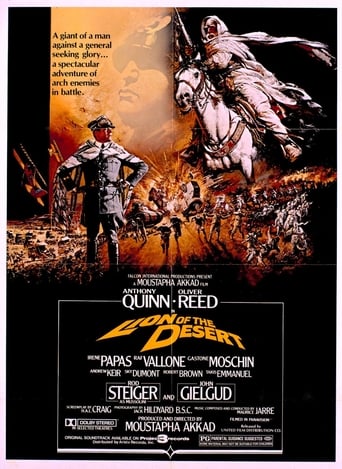



Who payed the critics
It's funny watching the elements come together in this complicated scam. On one hand, the set-up isn't quite as complex as it seems, but there's an easy sense of fun in every exchange.
View MoreThe best films of this genre always show a path and provide a takeaway for being a better person.
View MoreIt's a good bad... and worth a popcorn matinée. While it's easy to lament what could have been...
View MoreIn the Fascist Italy Pre-World War II of Benito Mussolini (Rod Steiger), the cruel General Rodolfo Graziani (Oliver Reed) is directly assigned by Il Dulce to fight in the colonial war in Libya to vanquish the Arab nation. However, his troops are frequently defeated by the national leader Omar Mukhtar (Anthony Quinn) and his army of Bedouins. But the Butcher of Ethiopia and Libya uses a dirty war against the natives, slaughtering children, women and aged people, to subdue Mukhtar."Lion of the Desert" is an epic masterpiece that shows part of the cruel colonization of Arab population, this time showing the fascist army of Mussolini in Libya.This movie is simply among the best I have ever seen, with magnificent direction, performances, dialogs, cinematography and music score by Maurice Jarre. The work of Moustapha Akkad is perfect and it is amazing the reality of the battle scenes in a time where the industry did not use computer to simulate them. He also entwines footages from archive with the realistic scenes.Anthony Quinn and Oliver Reed give the performance of their lives and their duel is among best in the cinema industry, and supported by names such as Irene Paps, Raf Vallone, Rod Steiger and John Gielgud among others. My vote is ten.Title (Brazil): "O Leão do Deserto" ("The Lion of the Desert")
View MoreNow that Libya is in the news, it might be good to look at this film, made 30 years ago. It deals with the two decades long rebellion by one Omar Mukhtar against the Italian colonial authorities in Libya, and how it was finally suppressed, through ruthless means, by the army of Mussolini in 1931. This movie was famously financed by Gaddhafi, whose funds allowed this relatively unknown war to be brought to the screen with a decent budget. The director was Syria's Mustapha Akkad, who would die two decades and a half later in a terrorist bombing. With its fine battle scenes, showing a diversity of military tactics, I think that military buffs will especially appreciate this film. The movie naturally has an anti colonialist point of view, but it's not unfair to the Italians, who are the center of much of the movie (despite this, this movie was banned in Italy for decades). As a movie dealing with the anti colonial struggle in the Arab world it can be favorably compared to the Battle of Algiers (Lawrence of Arabia is another movie that comes to mind). Anthony Quinn is impressive as the old, noble Omar, but the best performance of the movie to me is by Oliver Reed, as the brilliant but ruthless Italian general Graziani. Unfortunately, Rod Steiger, in his brief role as the Duce, just doesn't cut it, it looks like a poor parody and he even looks embarrassed to be there. And while not as bad a performance, John Gielgud is just not believable in his supporting role as an Arab sheik allied with the Italians. The movie could have been a bit tighter as well (it's almost three hours long) but despite these minor flaws, I recommended strongly.
View MoreI'm not questioning the math of it, that part's quite clear. No, why did this not get more attention? Perhaps too few know the history, which I must admit that I, myself, was unaware of, though it feels quite authentic. It could be the violence... this is rather brutal, and there are those that would call it downright distasteful. Personally, I call it "realistic" and "not unnecessarily toned down". War is not pleasant, much less glamorous. That is a myth, perpetrated by those who wish to keep it going, the people who benefit. This gives an accurate depiction of the fighting, for both sides. Regardless of the reason, I hope that this film is no longer overlooked. Akkad directed three times, and I've now seen, and rated perfect 10's, two of them, the one remaining being an Arabic version of Mohammad: Messenger of God, which was in English. I don't know what kept him out of the chair apart from these instances, but I hope he felt he had told all that he had in him, for it would be a true shame if he did not get the chance to. The plot is incredible, and genuinely inspirational. Writing, all the way, is excellent, the credible characters with proper motivation, the memorable and quotable dialog, and the script as a whole, all amazing. The music is an epic, orchestral score. All of the effects and action are impeccable. The acting performances are beyond reproach. While this does, off course, hold some bias, I never felt manipulated or lied to, as I watched it. Instead, I was engaged and experienced a recreation of the past, and a portion of it that should not be forgotten. In spite of the listing here on the site, the cut I saw was 153 minutes, or about two and a half hours, long. There is no sexuality or language in this. The DVD comes with a theatrical trailer and a making of, produced around the same time as the feature, and they are good and well-done with that in mind. I recommend this to anyone who believes they can stomach the gruesome visuals that are found(I maintain that the use, and amount, are not gratuitous) in it. 10/10
View MoreThe second (follwing Mohammed, Messenger of God) of producer turned director Moustapha Akkad's rather foolhardy attempts to create a popular Islamic cinema using Western cinematic and narrative forms which were 20 years (at least) out of date even in Hollywood, Lion of the Desert tells the story of the 20 year campaign of resistance against Italian imperialist occupation by the Bedouin desert armies of Omar Mukhtar. Anthony Quinn, who was also in Mohammed, play Mukhtar as someone's kindly old uncle, a wily old desert lion with one spectacled eye on the Koran and the other on the field of battle. Oliver Reed plays his nemesis, the Italian fascist General Rodolfo Graziani.The film is a fairly simplistic affair. Mukhtar and his fellow Bedouin are the personifications of good, patiently and relentlessly opposing the mechanistic might of the Italians. It's horses and guns versus tanks and bombs for the most part, and the film makes no bones about being propaganda for Mukhtar's resistance movement - not too difficult to swallow, considering the army he was facing. Yet in creating such a black and white view of reality (reminiscent of the many popular films the allies produced during and after the 2nd World War), the film comes across as dated, unambiguous and conceptually crude. The society that Mukhtar was defending is not questioned, even though it is clearly a society which is relentlessly anti-modern and in which women have very little active role to play. There is an intriguing scene in which a grieving war widow brings her son to Mukhtar's tent, and the old lion gives the boy his father's book and instructs him to "tell your mother to keep it safe for you." The woman must be told by the man, even when the man is her tiny child...The film is pretty successful in cramming a long historical story into two and a half hours of screen time, and the narrative is pretty clear. H.A.L Craig's screenplay makes rather too much use of repetitive motifs, which don't develop as the story goes on but simply come up again and again at intervals. The two most notable of these motifs are the constant encounters with "good" Italians who although they wear a fascist uniform shrink from the more abhorrent crimes they are asked to perform and have a scarcely hidden admiration for Mukhtar (exemplified by Raf Vallone's veteran negotiator), and Bedouin children in jeopardy but learning from the "spirit of Mukhtar" - this latter strand of motif leans towards the cloying and sentimental.There is a lot to admire in the film as an achievement in big-scale movie-making. The camera-work is excellent throughout, the battle sequences impressive and certain set-pieces (the montage of the concentration camps the Italians put the Bedouin in; the hanging of Mukhtar) are impressive and worth watching the film for. The performances are pretty ripe, except for Quinn, who over-eggs his pudding by being too kindly, too scholastic, too intrinsically good to convince as a real human being. We expect Reed to be hammy, but he is large without being absurd, and predictably outdone by Steiger doing a shouting turn as Mussolini (a role he also played in 1974's Mussolini: Ultimo atto). Far worse is the tendency to cast veteran British Thespians as elder Arabs: Andrew Keir just about gets away with it, but John Gielgud as a wily old collaborator with the Italians is preposterous, with his rich upper class English tones and pale skin.There's a certain pan-historical element to the story - the Bedouin stand for all colonised peoples fighting their colonisers; this is made explicit in the film by Mussolini comparing the wall Graziani builds with Hadrian's, and one gets the feeling watching the film that it could be inspirational to the oppressed people of Palestine now. Mukhtar, with his high ideals and refusal to torture or kill prisoners, is a very different Muslim fighter to the popular Western image of the suicide bomber today, which only makes director Akkad's death in 2005 in Amman, Jordan by an Al-Qaeda suicide bomber the more bitter and tragic.
View More